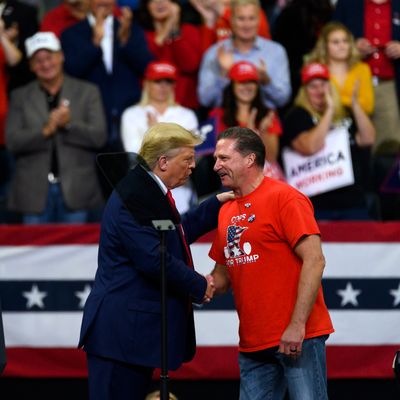
Last October, Minneapolis Police Union president Bob Kroll appeared at a Trump rally. Clad in his red “Cops for Trump” T-shirt, Kroll (who has been alleged to be affiliated with white supremacists) gloated that the president had unshackled his officers from the restraints imposed by Trump’s predecessor. “The Obama administration and the handcuffing and oppression of police was despicable,” he told the crowd. “The first thing President Trump did when he took office was turn that around, got rid of the Holder-Loretta Lynch regime and decided to start takin— letting the cops do their job, put the handcuffs on the criminals instead of us.”
We will never know if that unshackling emboldened Derek Chauvin to murder George Floyd. But the line between the relief demanded by Kroll on behalf of Minneapolis police, and the naked assassination committed on camera by one of his officers, is quite direct. The world around us, in which the streets of every major American city are filled with protesters, is the result of Trump granting the wishes of the most retrograde police officers. They are getting what they asked for.
The last few years of the Obama administration were one of the most productive periods of criminal justice reform in American history. The Obama administration changed sentencing guidelines to reduce the disparity in the treatment of drug crimes that had disproportionately harmed black defendants. As part of an effort to inculcate a “guardian, not a warrior” mindset, it restricted the transfer of surplus military equipment to police departments. Most importantly, it formed consent decrees with more than a dozen police departments to force them to change their practices.
These reforms did not root out brutality and racism. They were mild both in form and intent, undertaken with the goal of conciliating police and their communities, believing that enhancing trust would ultimately create safer conditions for police as well as those who fear them. It was the epitome of evolutionary cultural change.
This was the context for Trump’s nightmarish claims in 2016 that cities were being overtaken by bloodshed and carnage. Whatever wisps of data he could cite to support his wild rhetoric, Trump was drawing a picture borrowed from the imaginations of resentful police who experienced Obama’s carefully drawn nudges as intolerable oppression.
He reversed them swiftly. Trump’s first attorney general, Jeff Sessions, ended the restriction on transferring military equipment to police, reviewed all consent decrees struck by his predecessor, and then restricted their use going forward. “It is not the responsibility of the federal government to manage non-federal law enforcement agencies,” he insisted.
When William Barr took over for Sessions — whom Trump fired for refusing to violate Justice Department guidelines — there was nothing left of the Obama reforms to undo. Still, Barr continued to rail against the specter of criminal justice reform. Barr presented the reform movement, now confined to local officials, as a civilizational threat. “There is another development that is demoralizing to law enforcement and dangerous to public safety,” he railed last August, “that is the emergence in some of our large cities of district attorneys that style themselves as ‘social justice’ reformers, who spend their time undercutting the police, letting criminals off the hook, and refusing to enforce the law.” (Letting criminals off the hook is only acceptable if Barr is doing it himself.)
In another, even more unhinged speech two months later, Barr warned, “If communities don’t give [police] that support and respect, they might find themselves without the police protection they need.” The enthusiastic assent of both Sessions and Barr indicates how broadly reflective Trump’s agenda is within his party. Trump’s hatred of criminal justice reform is not just bleating from an old racist who still thinks the Central Park Five were guilty. It is party doctrine.
And it was not enough for Trump and his supporters merely to uproot the seedling of criminal justice reform. Trump felt obliged as well to clamp down on peaceful protest. When Colin Kaepernick took a knee during the national anthem to protest police brutality, Trump intimidated owners into blacklisting him from their rosters, even boasting of his success. Trump dispatched Mike Pence to stage a walkout from an NFL game when players kneeled, and prevailed upon the league to stamp out the kneeling altogether.
It probably gives Trump far too much credit to presume this is a strategy. But there is a crude logic to his actions. He has snuffed out the peaceful, democratic avenues for evolutionary change, while goading the most violent police officers and offering them unconditional support. He is all but calling forth into the streets the very brutality he claimed would be necessary. If a militarized and unshackled police seemed excessive to many Americans three years ago, Trump now has conditions that might make it appear necessary to some.
What Trump and Barr cannot say to the protesters now is that they should try working through the system instead. They snuffed out every avenue of bureaucratic and social change. They sowed the wind and now reap the whirlwind.






























